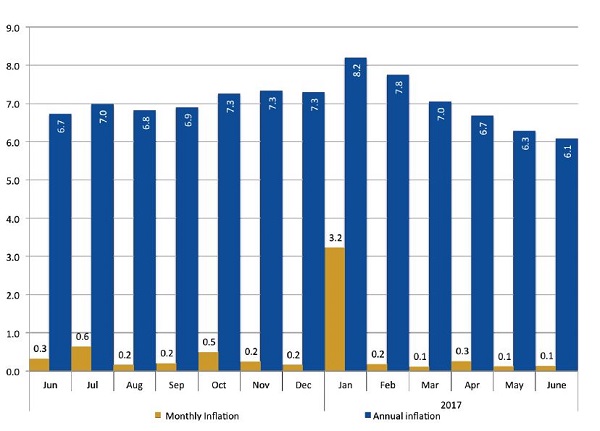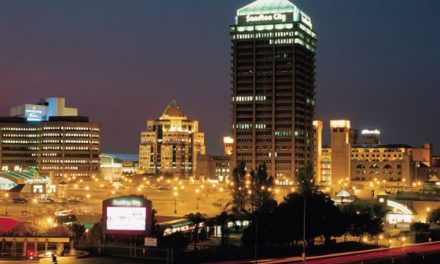
Inflation continues to come down – relief for households with basic commodities except meat

Namibian inflation, measured monthly and compared to the same month a year ago, moderated during June 2017, continuing the declining trend since its peak in January this year.
The latest statistics for the Namibian Consumer Price Index, released by Statistician General, Mr Alex Shimuafeni on Thursday morning, 13 July 2017, show that annual inflation continued to slow down during June.
“The annual inflation rate for the month of June 2017 decelerated to 6.1 percent down from 6.7 percent recorded in June of the preceding year, a slowdown of 0.6 percentage points” Shimuafeni stated in the monthly NCPI bulletin prepared by the Namibia Statistics Agency. “The downward
trend of declining monthly annual inflation from January 2017 continued” he added.
However, cautioning that average annual inflation still remains elevated, he said “The average annual inflation rate for the period January to June 2017 stood at 7.0 percent while the corresponding average rate registered during the same period a year earlier was estimated at 6.3 percent.”
The major drivers of the annual inflation rate for June are Housing, water, electricity, gas and other fuels (9.8%), Hotels, cafes and restaurants (8.7%), Education (7.8%), Miscellaneous goods and services (6.1%) and Health (6.1%).
Digging deeper into the constituent elements of the overall index, it is clear that the item with the heaviest weighting, Housing, water, electricity, gas and other fuels, also contributed most to the overall consumer price growth rate. This category accounts for over 28% of the total weight of the basket comprising 350 items allocated and classified into 12 categories, each with its own sub-categories.
Explaining the unavoidable distortions that arise from weighting, Shimuafeni stated “Namibian inflation is largely determined by three categories of the overall NCPI basket, namely: (i) Housing, water, electricity, gas and other fuels, (ii) Food and non-alcoholic beverages and (iii) Transport, which cumulatively make up just under 60 percent of the total inflation basket.”
“Additionally, following the rebasing of the NCPI basket in 2013, “Alcoholic beverages and tobacco” make up an additional 12.6 percent of the basket, meaning that the four largest categories represent well over 70 percent of the total basket. As such, a large increase in inflation in these categories has a greater impact on the overall inflation than do increases in the lower weighted categories. Thus, it is rare to see major increases in overall inflation attributed to the lower weighted categories, despite the fact that these categories may have seen relatively high inflation in their own right” he continued.
The positive downward trendline for the prices of goods, is not mirrored by services. As is expected, most services increase their rates only once a year, typically in January. This is confirmed by the data which shows an 8% increase for services in January this year, which then remained more or less stable for the year to date.
But the sub-categories also reveal gross inefficiencies so it comes as not surprise that water is 11.5% more expensive in June 2017 than a year ago. Similarly, electricity is also far above the average, posting a 10.2% increase compared to last year June.
The good news is that sub-categories where prices actually came down, include such vital items as bread, cereals, vegetables, furniture, insurance and public transport. The single sub-category that posted the biggest decline is Package Holidays, now 14.1% cheaper than a year ago.
“The main contributor to lower transport inflation was the drop in price increases for the operation of personal transport equipment, which refers mainly to fuel. The reduction in fuel prices by 50 cents in June resulted in the decline of the inflation rate for this category from 9.3 percent in May to 5.8 percent in June” said the Executive Director of the Economic Association of Namibia, Mr Klaus Schade.
“The annual inflation rate averaged 7.0 percent over the first half of 2017, which is above the average inflation rate for the first half of 2016 of 6.3 percent. We expect, however, that the annual inflation rate for 2017 will stay slightly below the inflation rate of 6.7 percent in 2016. The expected good crop harvests will help stabilise food price inflation even though meat prices might remain under pressure. This is due to less livestock being slaughtered because of improved grazing conditions. Transport inflation will slow down further in July, because of another drop in fuel prices by 50 cents per litre” he concluded.











































